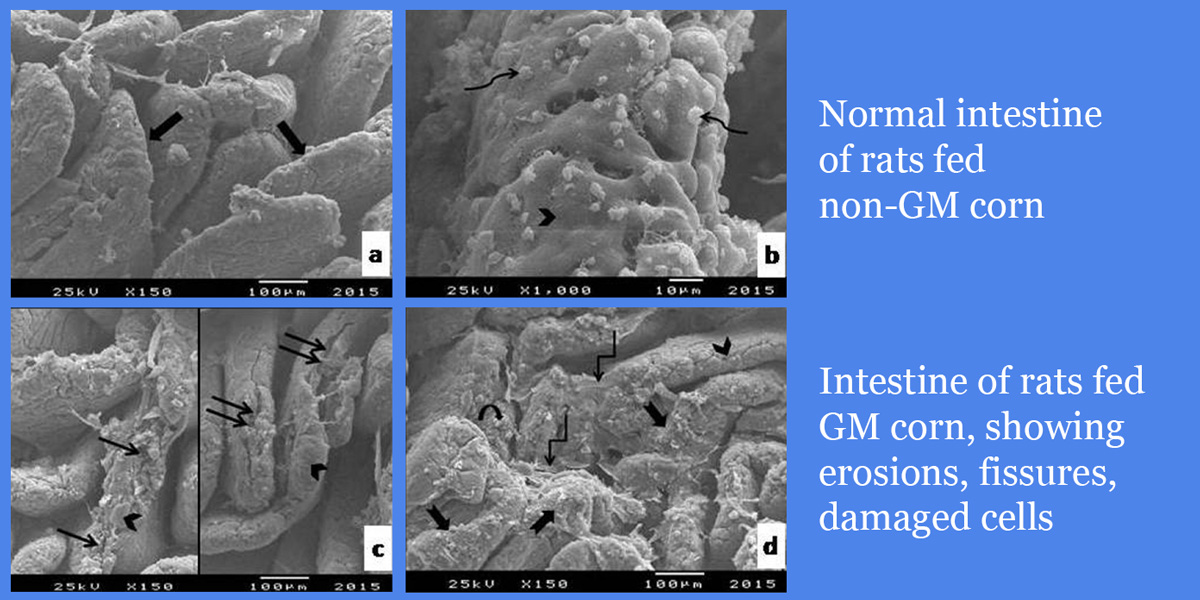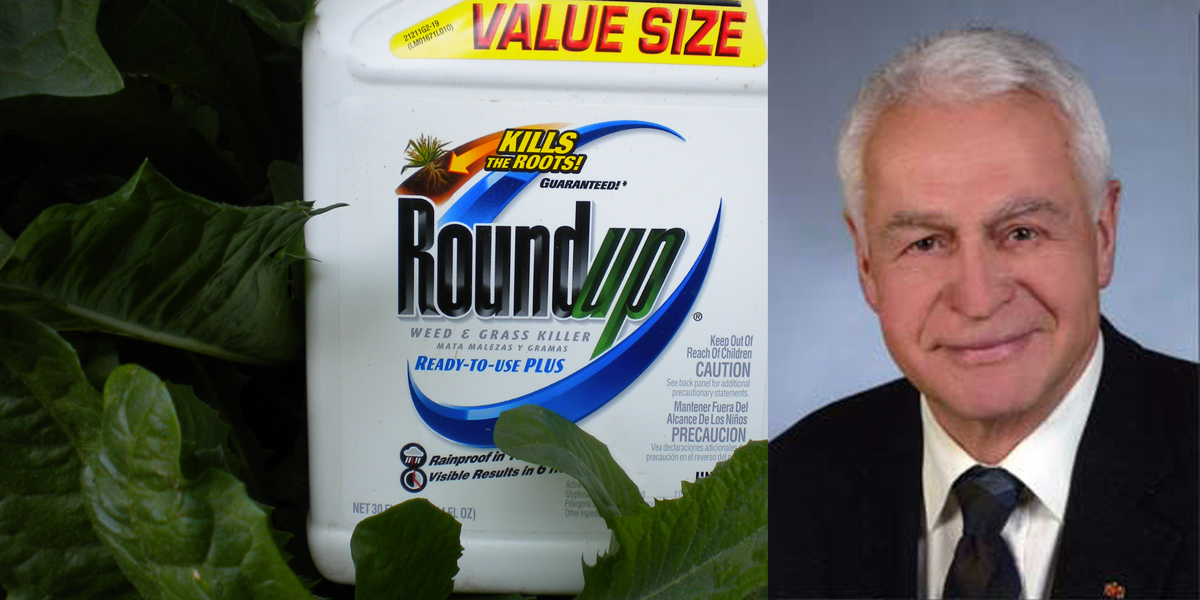Monsanto GM corn MON810 damaged the intestines of rats – new study
Rats fed GM Bt corn MON810 for only 90 days suffered serious damage to the surface mucous membranes of the jejunum (part of the small intestine), according to a new study. The researchers commented that the findings contradict reassuring reports on GM products. The EU Commission is trying to get approval for this corn to be grown in Europe.
GM maize coming to Europe’s fields?
The EU Commission wants to allow the cultivation of GM maize before the 2017 growing season starts. Three variants of GM maize producing insecticidal toxins, registered as MON810, 1507 and Bt11, are being considered. Large-scale cultivation of the GM plants can result in risks to health and agro-ecosystems, none of which have ever been assessed in detail, including combinatorial effects. Moreover, the GM genes may spread into the environment via gene flow to teosinte, a wild relative of maize. GMO companies have illegally concealed the fact that teosinte is spreading in Spanish fields. Mute Schimpf of Friends of the Earth Europe called the GM maize varieties “untested, unwanted and unnecessary”.
Landmark ruling: Research on dangers of pesticides must be made public
In an important victory for public health and the environment, the European Court of Justice has ruled that safety tests conducted by the chemical industry and used by regulators to assess the dangers of pesticides must be disclosed. It argued that such research falls under “information on emissions into the environment”, as defined under the Aarhus Convention and the EU law implementing this Convention. According to an article for Politico, the groundbreaking decision is set to irk large agribusinesses determined to keep commercially sensitive information out of the public spotlight. However, some NGOs are concerned that a potential loophole for industry has been written into the ruling, which might allow crucial animal feeding studies to be exempted from disclosure.
Americans don’t trust scientists on GM foods
A new Pew Research survey focuses on public attitudes to GM foods. People’s views of scientists connected with GM foods in this new survey were revealed to be “largely skeptical, or at best, tepid”. Half of those who care deeply about the issue of GM foods say that scientific findings about GM foods are influenced by the researchers’ desires to help their industries “most of the time”. And just two-in-ten (19%) Americans say scientists understand the health effects of GM foods “very well”. Some 44% of Americans say scientists understand this “fairly well” and 35% say scientists “do not understand the health effects of genetic modification at all or not too well”.
US farmers in retreat from all-GMO
Despite the US’s adoption of GM crops, yields there are no better than in Europe and the drop in grain prices makes expensive GM seeds less attractive than non-GM seeds. That is the message of an analysis of US farmers’ disillusionment with GMOs, from the French daily business paper Les Echos.
How 121 Nobel laureates were misled into promoting GM foods
Over the last four months, 121 Nobel laureates have signed a letter extolling the safety and benefits of GM crops. Prof David Schubert and Steven M. Druker, JD explain why they consider the letter an affront to science and the public trust.
Alarming levels of glyphosate contamination found in popular American foods
Glyphosate, the world’s most widely used herbicide linked to Monsanto’s Roundup Ready GM crops, has been found at alarming levels in a wide range of best-selling foods across the US, Food Democracy Now! and The Detox Project announced. The story was covered by The Sun newspaper in the UK, among others. And see this interview with Dave Murphy, founder and executive director of Food Democracy Now!,on “News With Ed”.
Independent scientists set up international research project on GMO plant risks
A new project dealing with the risks of GM plants was set up this week. The project is independent of the interests of the biotech industry. The experts from the public sector and civil society who are involved agree that current regulatory practice as applied in risk assessment of GM plants in Europe is not adequate to safeguard health and the environment.
GM iron and zinc biofortified rice not adequately tested for safety
With funding from the Gates Foundation, University of Melbourne plant biologist Dr Alex Johnson and colleagues have developed a GM rice that contains increased iron and zinc. Just as with GM golden rice, the new rice is being touted as a marvel that will help solve hunger in the developing world. The rice is targeted for release in Bangladesh even though it has not undergone even basic safety testing. Molecular geneticist Dr Michael Antoniou commented, “The Bangladeshi people should not be used as lab rats for this inadequately tested product.”
Scientists genetically modify plants for improved photosynthesis – but long road ahead
Scientists at the University of Illinois have genetically modified plants for improved photosynthesis, leading to a 20% increase in the plants’ productivity. But according to a New York Times report, crops engineered in this way won’t be commercially available for at least a decade. However, a gushingly pro-GM report on BBC TV News on 17 November at 10pm ended with the throwaway remark by the reporter that commercial use is 20 years away, according to the researchers. Also one senior scientist interviewed said the final crops would not be GM – that was just being used to unravel genetic processes.
Strict approvals needed for gene-edited crops: German minister
The European Union should apply strict approval standards to new generations of gene-edited crops similar to those for older-type GMOs, Germany's junior environment minister said.
UK’s National Farmers Union sounds warning over GM crops
The UK should tread carefully on introducing commercial GM crops, at the risk of alienating important markets, said NFU vice-president Guy Smith.
Waitrose brings in responsibly sourced non-GM soy feed
Waitrose has become the first UK supermarket to introduce responsibly sourced non-GMO animal feed from Europe, marking a “beginning of the end” of the last large-scale use of GM crops in the UK, according to the Soil Association.
Argentina: University academic persecuted for denouncing GMOs and agrochemicals
Dr Damián Verzeñassi spoke at the Monsanto Tribunal in The Hague about the health impacts of GMOs and associated pesticides in Argentina. For his pains, his office was chained shut and his fellow researchers were removed from their posts.
GM crops’ entry into India based on blatant fraud
If India’s Supreme Court green-lights GM mustard, there will be devastating implications for Indian food and agriculture. Environmentalist Aruna Rodrigues has petitioned India's Supreme Court, seeking a moratorium on the release of any GMOs into the environment pending a comprehensive, transparent and rigorous biosafety protocol in the public domain. Rodrigues' case is that serious conflicts of interest, sleight of hand, regulatory delinquency, cover-ups, lies and scientific fraud have tainted the appraisal process concerning GM mustard. In one of the clearest signs yet of the Indian government’s intention to push GM mustard, the Minister for Environment and Forests Anil Madhav Dave said all public health related issues about the crop have been "adequately addressed".
India: Bt cotton comes under pink bollworm pest attack
In India, GM Bt cotton has fallen victim to pink bollworm attack. The problem seems to be limited to Bt cotton.
GM Bt cotton has failed in Pakistan
In Pakistan, official figures show cotton yield and production have declined since GM Bt cotton was adopted; also, new pests have emerged.
US: Mid-South cotton growers are spraying Bt cotton with pesticides more and more every year
Mid-South cotton growers are spraying GM Bt insecticidal cotton with chemical pesticides more and more every year, says Arkansas Extension Cotton Specialist Bill Robertson, and “some technology traits are holding up better than others — but we’re having to overspray all technologies more now than we have in the past.” The problem lies in growing pest resistance to the Bt toxins engineered into the crops.
Game over for herbicide-tolerant GM crops
As farmers try to control glyphosate-resistant weeds with other herbicides to which many weeds are already also resistant, a new peer-reviewed paper foresees the end of the road for herbicide-tolerant crops and the “chemical and transgenic treadmills” that they engender.
Profits soar in organic soybeans, corn: economist
Organic corn and soybean production is far more profitable than conventional, according to a US Department of Agriculture analysis.
Local governments can prohibit GM crops, says US Court of Appeals
The US Court of Appeals has ruled on whether federal and Hawaii state laws preempt Hawaii counties' authority to regulate GM crops and pesticide use. Of significance to state and local communities throughout the US, the court ruled that federal law does not prohibit states and counties from passing local laws to regulate and ban commercially grown GM crops. Disappointingly, however, the court also ruled that under Hawaii law, counties and municipalities do not have the authority to regulate GM crops (as some in other states do), and that Hawaii state law places such authority in the hands of the State alone.
Enlist Duo: Effective new herbicide or monarch butterfly threat?
The Environmental Protection Agency has proposed to expand the use of Enlist Duo, a weedkiller, from 15 to 34 states. But there are strong concerns about its toxicity.
Dow And DuPont, Bayer and Monsanto, or Syngenta and ChemChina - which will succeed?
Mergers are proposed between ChemChina and Syngenta, Dow Chemical and DuPont, and Monsanto and Bayer. Each individual deal seems possible, but can regulators approve them all?
US: Organic standards will exclude next generation of GMOs
The National Organic Standards Board voted unanimously on Friday to update US organic standards to exclude ingredients derived from next generation genetic engineering and gene editing.
Vital soil fungi damaged by GMO Bt cotton
A study of GMO cotton varieties shows they disrupt an important beneficial soil fungus..
Nigeria: Agency warns against consumption of GM foods
The National Biosafety Management Agency (NBMA) of Nigeria has warned members of the public to be wary of GM products that are on offer in some stores. It said none of the products has yet been approved for local and commercial consumption.
Endocrine disruptors: The manufacture of a lie
The European Commission, with the help of the European Food Safety Authority (EFSA), has set itself at odds with the mainstream scientific community in order to avoid stringent regulation of hazardous endocrine disruptors.
Let’s stop the manipulation of science
Around a hundred scientists have asked Europe and the international community to act against endocrine disrupting chemicals. They condemn the use of strategies for manufacturing doubt, which are the same as those employed by industries in the climate change battle.
GM mosquitoes could be released in Florida Keys by spring
GM mosquitoes could be released in the Florida Keys as early as this spring, after voters in Monroe County, Florida, approved the experiment in a referendum on election day. Residents living in the original location for the trial – Key Haven – voted against it.
LOBBYWATCH
Expertise for sale: How an expert with close links to industry has been influencing policy for decades
In 2015 toxicologist Helmut Greim told the German Parliament that glyphosate herbicide doesn’t pose a cancer risk. But he has a history of defending toxic products that dates back to 1994 – and has been less than transparent about his industry links.
How self-appointed guardians of “sound science” tip the scales toward industry
At a time when public mistrust of science runs high and non-experts are hard-pressed to separate fact from industry-sponsored spin, Sense About Science purports to help the misinformed public sift through alarmist claims about public health and the environment by directing journalists, policymakers, and others to vetted sources who can explain the evidence behind debates about controversial products. But Sense About Science does not always disclose when its sources are scientists with ties to the industries under examination. And the group is known to take positions that buck scientific consensus or dismiss emerging evidence of harm, says a new exposé that’s worth reading in full. For Sense About Science’s role in the GM crops debate, see this article by Jonathan Matthews of GMWatch.
US EPA capitulates to Big Ag, removes epidemiologist from glyphosate review
The EPA has capitulated to CropLife (a Monsanto- and industry-funded group) and removed the epidemiologist Dr Peter Infante from the glyphosate review panel. CropLife had specifically demanded that EPA remove Dr Infante, in part because he might favour independent research over industry-funded studies.
US: Author of the DARK Act to kill GMO labelling named as new CIA head
US president-elect Donald J. Trump has selected Representative Mike Pompeo, a hawkish Republican from Kansas and a former Army officer, to lead the CIA. Pompeo was the designated hitter for Monsanto and the other Big Ag chemical and seed players in 2014 when the industry rolled out a federal effort to block states from mandating the labelling of GM foods. Pompeo introduced the “Safe and Accurate Food Labeling Act” in April of that year with the intention of overriding bills in roughly two dozen states.













